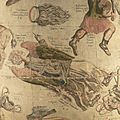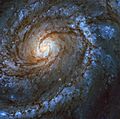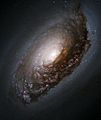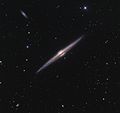Coma Berenices facts for kids
| Constellation | |
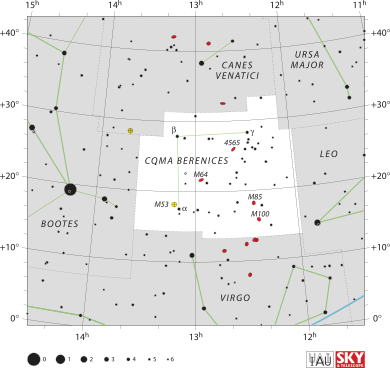
List of stars in Coma Berenices
|
|
| Abbreviation | Com |
|---|---|
| Genitive | Comae Berenices |
| Pronunciation | genitive |
| Symbolism | the Berenice's Hair |
| Right ascension | 11h 58m 25.0885s–13h 36m 06.9433s |
| Declination | 33.3074303°–13.3040485° |
| Area | 386 sq. deg. (42nd) |
| Main stars | 3 |
| Bayer/Flamsteed stars |
44 |
| Stars with planets | 5 |
| Stars brighter than 3.00m | 0 |
| Stars within 10.00 pc (32.62 ly) | 1 |
| Brightest star | β Com (4.26m) |
| Messier objects | 8 |
| Meteor showers | Coma Berenicids |
| Bordering constellations |
Canes Venatici Ursa Major Leo Virgo Boötes |
| Visible at latitudes between +90° and −70°. Best visible at 21:00 (9 p.m.) during the month of May. |
|
Coma Berenices is a constellation in the northern sky. It's often called "Berenice's Hair" because of an old story. This constellation is a group of stars that look like a faint, flowing shape. You can find it between the bright constellations of Leo (the Lion) and Boötes (the Herdsman). It's best seen in the spring sky.
Contents
The Story of Berenice's Hair
A Queen's Sacrifice
The name Coma Berenices comes from a real person: Berenice II of Egypt. She was a queen who lived a very long time ago, around 250 BC. Berenice was married to King Ptolemy III Euergetes.
A Promise to the Gods
One day, King Ptolemy went off to war. Queen Berenice was very worried about him. She made a special promise to the gods: if her husband returned home safely, she would cut off her beautiful long hair. This was a big deal because her hair was very famous and beautiful.
Hair in the Sky
When the king came back safe and sound, Berenice kept her promise. She cut off her hair and placed it in a temple. But the next morning, the hair was gone! The king and queen were upset. However, a wise astronomer named Conon of Samos had an idea. He told them that the gods were so pleased with Berenice's sacrifice that they had taken her hair and placed it in the sky. He pointed to a faint cluster of stars, saying it was Berenice's hair, shining forever among the constellations.
Finding Coma Berenices
Where to Look
Coma Berenices is a bit faint, so it's best to look for it on a clear, dark night away from city lights. It's located in the northern sky.
Using Other Constellations
You can find Coma Berenices by first locating some brighter constellations. Look for the "Sickle" shape of Leo (the Lion) and the bright star Arcturus in Boötes. Coma Berenices is found right between these two. It's also next to the "Big Dipper" (part of Ursa Major). If you draw a line from the handle of the Big Dipper through Arcturus, you'll be pointing towards Coma Berenices.
Stars of Coma Berenices
Faint but Interesting Stars
Coma Berenices doesn't have many super bright stars. Its brightest star is Beta Comae Berenices. This star is quite similar to our own Sun, but it's a bit brighter and larger. It's about 30 light-years away from Earth.
Alpha and Gamma Stars
The constellation also has Alpha Comae Berenices and Gamma Comae Berenices. Alpha Comae Berenices is a double star, meaning it's actually two stars orbiting each other. Gamma Comae Berenices is a single star that's much bigger and brighter than our Sun.
Deep-Sky Objects
Galaxies Galore
Coma Berenices is a special place in the sky because it's home to many, many galaxies. A galaxy is a huge group of stars, gas, and dust, all held together by gravity. Our own solar system is part of the Milky Way galaxy.
The Coma Cluster
One of the most amazing things in Coma Berenices is the Coma Cluster of galaxies. This is a giant group of thousands of galaxies, all located very far away from us. It's one of the closest large galaxy clusters to our own Local Group of galaxies. Studying these clusters helps scientists understand how the universe grew and changed over billions of years.
Famous Galaxies
- Black Eye Galaxy (M64): This galaxy is famous for its dark band of dust that looks like a bruised eye. It's a spiral galaxy, meaning it has beautiful arms that swirl outwards.
- Messier 100: This is another stunning spiral galaxy. It's a "grand-design" spiral, which means its spiral arms are very clear and well-defined.
- Needle Galaxy (NGC 4565): This galaxy is seen edge-on from Earth, so it looks like a very thin needle of light. It's a beautiful example of a spiral galaxy viewed from the side.
- NGC 4651: Sometimes called the "Umbrella Galaxy," this spiral galaxy has faint, umbrella-shaped streams of stars around it. These streams are likely leftover pieces from a smaller galaxy that it absorbed long ago.
- NGC 4789A: This is a dwarf irregular galaxy, which means it's smaller and doesn't have a clear shape like a spiral or elliptical galaxy.
Meteor Showers
Coma Berenicids
A meteor shower is when you see many "shooting stars" in the night sky. These aren't really stars falling, but tiny pieces of dust and rock from space burning up as they enter Earth's atmosphere. The Coma Berenicids is a meteor shower that seems to come from the direction of Coma Berenices. It happens every year in December.
Images for kids
-
Bust of Berenice II of Egypt
-
Messier 100 taken with Hubble's Wide Field Camera 3
See also
 In Spanish: Coma Berenices para niños
In Spanish: Coma Berenices para niños
 | Chris Smalls |
 | Fred Hampton |
 | Ralph Abernathy |



